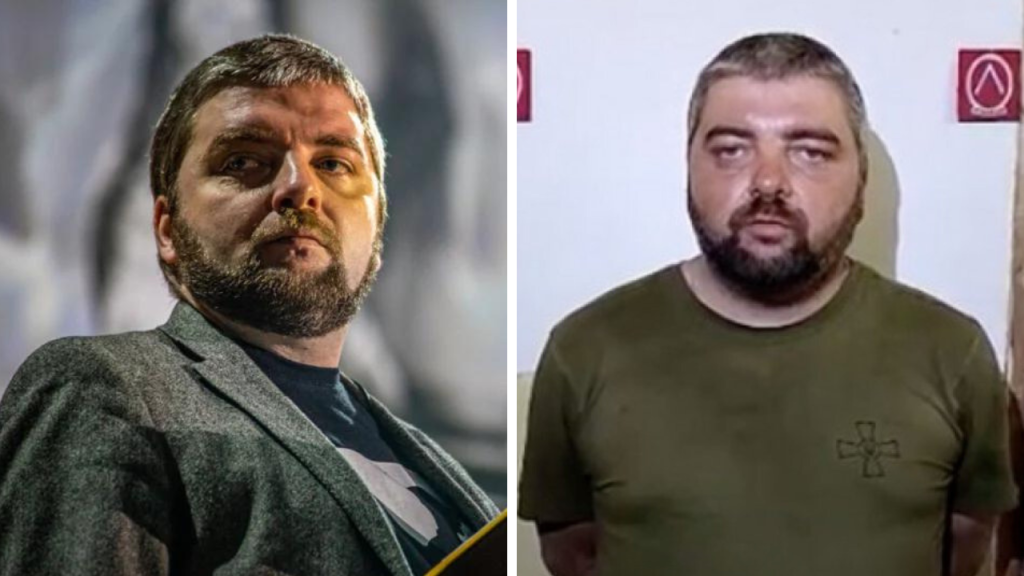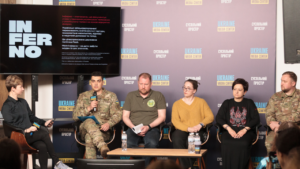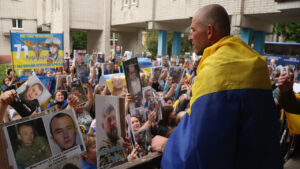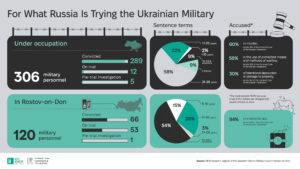“These testimonies were not written by me”, — human rights activist Maksym Butkevych delivered his final speech in the occupation court in Luhansk

Today, July 16, 2024, Ukrainian human rights activist Maksym Butkevych turns 47. After the start of the Russian invasion, he joined the Armed Forces of Ukraine and was captured in June 2022, where he has been held for over two years. A criminal case was fabricated against Maksym Butkevych, resulting in a court in occupied Luhansk sentencing him to 13 years in prison. Today, we are publishing the full text of his speech during the cassation hearing of his case by a Russian court, recorded by one of the attendees.
For over 16 years, I have been engaged in activities to protect human rights and civil liberties. In particular, I have tried to assist refugees and internally displaced persons and counteract xenophobia in its various forms. Therefore, the accusations of the crimes I am charged with are most contrary to the values I uphold and the activities that are the primary cause of my life. In most cases, similar to mine that I am aware of, captured Ukrainian soldiers are accused of committing crimes against civilians out of hatred or hostility towards the people of the Donbas region — even if they are from Donbas themselves. Something similar is likely to be implied in my case, even though it goes against everything I have spent years fighting against. However, this wording is not present in my case. The motive for the attempted ‘deliberate murder of two or more civilians in a socially dangerous way’ is stated as follows: allegedly, I committed this ‘with the intent to intimidate the civilian population, and with cruel treatment aimed at killing in a socially dangerous way.’ In other words, the purpose of the attempted murder was to intentionally kill the victims I was trying to intimidate in this way. No more or less. At the same time, all forensic psychiatric examinations revealed no signs of a temporary mental disorder at the time of the alleged crime in a person who supposedly decided to scare people by killing them…
However, the charges contain much more significant contradictions. The indictment, a document that can result in a person’s imprisonment, is drawn up immensely carelessly. In one place, the defendant, meaning me, is described as conscripted. In another, I am referred to as a military man under contract. In different parts of the text, I am assigned different positions. The text mentions the name of a specialized unit called ‘Bars,’ which has not been mentioned before or after and about which I know nothing. The start date of my service in the Armed Forces of Ukraine is also stated incorrectly. Inconsistencies from the first instance were corrected directly during the court hearing, and not all were fixed. For example, the incorrect start date of my service is recorded in the documents of this hearing as March 20, 2022, while actually, I started my service on March 4, 2022. Given all the above, a truly impartial and objective court dealing with such a carelessly drawn-up indictment would have thoroughly reviewed the collected materials to provide a truly independent, comprehensive assessment. However, this, of course, was not done. In a real court, the case would have gone down in flames.
Unfortunately, I did not have the opportunity to properly prepare for this hearing, including reviewing the Russian legal codes. However, even the brief time I had access to the Criminal Procedure Code was enough to learn that, according to part 2 of Article 77 of the Criminal Procedure Code of the Russian Federation, ‘An accused person’s confession to the commission of a crime may only serve as the basis for the accusation if their guilt is confirmed by a totality of evidence available in the criminal case.’ This describes what did not happen in my case. Apart from the confessions of the accused, meaning me, nothing links it to the incident. The victims do not mention me (in particular since both those who were injured and the person whose property was damaged refer to mortar fire and a ‘fallen mine,’ but not a shot from a grenade launcher). There is no weapon examination; the forensic medical examination did not determine which ammunition caused the injuries, only that it could not exclude a grenade launcher; and the ‘other studies of evidence properly assessed in the verdict’ mentioned by the second instance court in the appellate decision, do not exist and have never existed. To discover this, it is enough to just read the mentioned verdict. Thus, the case lacks any other evidence of the guilt of the accused besides the confessional statements (my), which, according to the Criminal Procedure Code of the Russian Federation, could not serve as the basis for the accusation. But they were, and the court, based on this accusation, found me guilty.
If these ‘confessional testimonies’ had been carefully evaluated, they would not have withstood even superficial scrutiny. For instance, the prosecution stated that I committed the crime by firing a German-made Panzerfaust grenade launcher. To do this, I supposedly ‘opened the packaging with grenades, assembled the grenade, loaded the grenade launcher, and fired.’ Even though the Panzerfaust is similar to the RPG-7 in terms of technical specifications, the design of these grenade launchers is different. The person who wrote this has no idea about the design of the Panzerfaust: its charges are not stored in packaging and do not require assembly. This and many other seemingly minor but significant details indicate that I didn’t write this testimony. I would never have thought of writing such a thing.
All these inconsistencies, inaccuracies, and lack of evidence, excluding the confessions I had signed, can be explained by one thing: these testimonies are not truthful, were signed under duress, but not written by me. I did not fire a grenade launcher at a civilian target on June 4, 2022, in the city of Sievierodonetsk; during the fighting, my unit was not even in that city. After being captured on June 21, 2022, my brothers-in-arms and I were repeatedly interrogated about the route of our unit’s movement, and these recorded testimonies are stored somewhere, if not destroyed. On June 4, 2022, I was actually in Kyiv. This is confirmed by the evidence my defender had requested to include before. Unfortunately, this is not surprising: of the dozens of convicted Ukrainian prisoners of war I have spoken with during this time, almost none were at the location where they allegedly committed the acts they ‘confessed to’ and with which they had no connection. My case is not unique. But I can declare with full responsibility to this court, at least about myself, that neither in June 2022 nor at any other time did I commit any actions against the civilians, nor did I commit any other violations of international humanitarian law, nor did I receive, give or, accordingly, execute orders aimed at committing such actions. Taking this opportunity, I also request that it be noted that I am not inclined to suicide, self-harm, or escape attempts, am non-confrontational, and do not resolve conflicts through violence.
I sincerely sympathize with the victims for what they have endured, the harm they have suffered, and the fact that their misfortune has been used to convict an innocent person. I have no illusions about the possibility of restoring justice within the Russian judicial system; however, I can no longer give testimony that does not correspond to reality. It is wrong and, ultimately, sinful — wrong from every perspective.
Judge (slightly surprised): Are you supporting the cassation appeal then?
Maksym Butkevych: Yes, I fully support it, including the statement that this was self-incrimination.
Judge: Why did you do it? Why did you slander yourself?
Maksym Butkevych: Because I was promised that if I signed the confession, I would be immediately exchanged for Russian military men convicted in Ukraine (as well as other convicted prisoners of war). If I refused to plead guilty, I would still be sentenced, with no prospect of exchange, and subjected to psychological and physical pressure. Some examples of such pressure were demonstrated.
Judge: The court is retiring to deliberate.
#freeMaksymButkevych
MIHR publishes a translation of Maksym Butkevych’s speech. In court, the speech was delivered in Russian.







